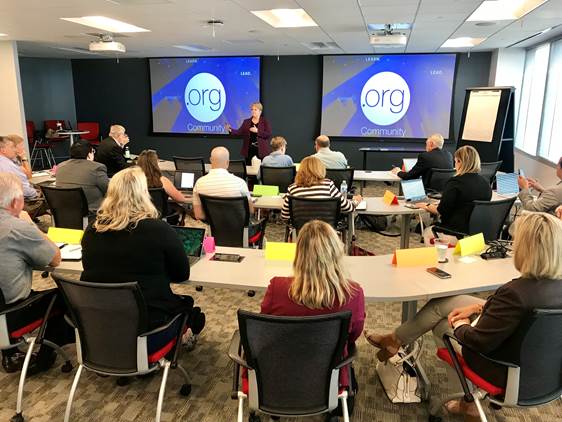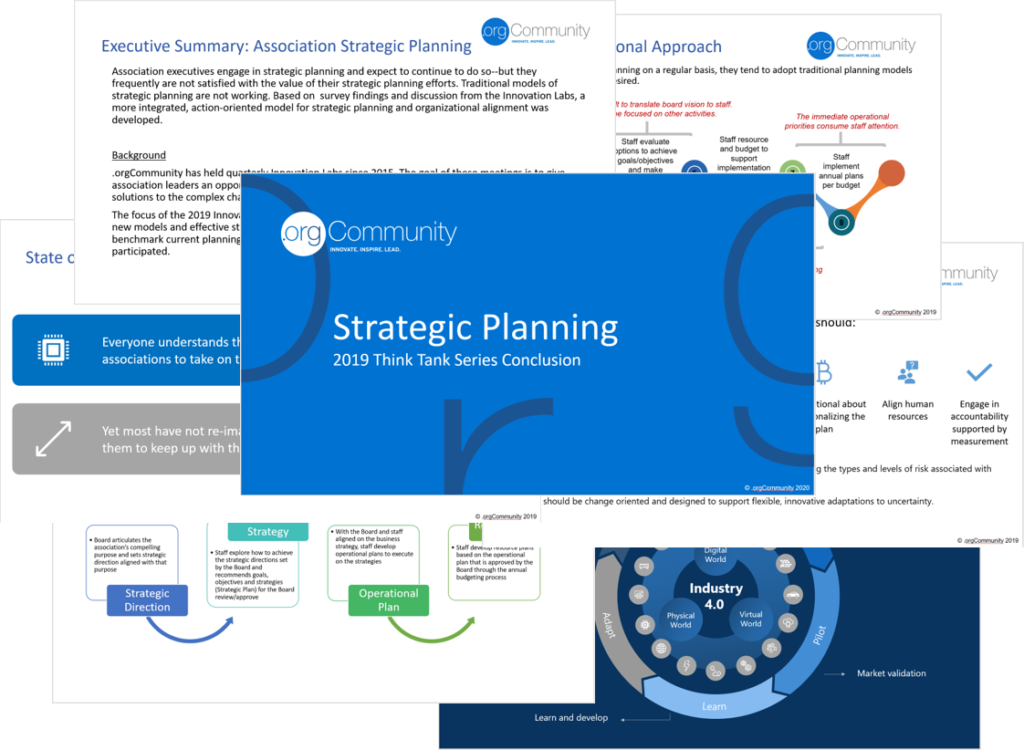How Think Tanks Help Association Leaders Learn to Be More Agile, Innovative, and Forward-Thinking
In today’s disruptive environment, it’s not only the rules of engagement that change quickly — it’s often the whole playbook. Rapid technological innovation coupled with increased competition is leading associations to rethink their business models and value propositions.
As a vibrant network of association executives, entrepreneurs and strategic partners, .orgCommunity is dedicated to shaping the future of associations. Through its collaborative events, small group learning opportunities and peer-to-peer counsel, .orgCommunity is a trusted partner to executives seeking to foster innovation and enhance leadership skills to achieve business goals and advance their organizations’ missions.
.orgCommunity’s think tanks are helping association leaders learn to be more agile, innovative and forward-thinking through original research and engaging discussions. The focus of the 2019 think tank series was on the topic of strategic planning.
The information below highlights the process .orgCommunity members adopted to build a solution for overcoming the roadblocks associated with strategic planning.

The Process
Identifying an Issue
Over the course of three half-day sessions, the group identified the challenge and roadblocks associated with strategic planning, collected input from other associations, and brainstormed new models and effective strategies to increase impact.
During the first session, the discussion focused on how association executives engage in strategic planning and expect to continue to do so, but also on how frequently they are not satisfied with the value of those efforts. The group agreed that traditional planning models are not as effective as they need to be.
Everyone understands the need to redefine their value equations in order to transform their business model and succeed in the marketplace. Yet because most professionals have not re-imagined the decades-old planning process, they are not able to keep up with the changing business landscape.
Collecting Data Through a Benchmarking Survey
Based on feedback from the first session, .orgCommunity conducted a survey to benchmark associations’ current and future needs for strategic planning. More than 150 associations participated. The conclusion was that there is a gap between formal planning and actual behaviors. Traditional plans no longer provide the ongoing focus needed to navigate the future.

Asking the Right Questions
The second session was a review of the benchmarking survey results and an exercise about asking the right questions. Participants asked questions within the framework of Why – What If – How.
By brainstorming fundamental and compelling questions related to strategic planning, the group quickly realized that the traditional approach isn’t necessarily failing; it simply isn’t as impactful as it could be.
Why do strategic plans fail or fail to impact? What if we asked more questions about our purpose?
The group created question sets about potential outcomes to focus on why, then what if, and finally how.
An example question set asks:
- Why do we optimize strategic plans to the association’s mission?
- What if we optimized our plans to create a desirable future for our members?
- How can we determine what that desirable future is?
- How do we design that desirable future?
- What if we optimized our plans to create a desirable future for our members?
Determining the Outcome and Output
After assessing the survey results over the course of several sessions, participants found that an integrated strategic planning process will help better prepare associations for the future.
An action-oriented model for strategic planning and organizational alignment was developed. The group also created a facilitator’s guide to help association executives identify and implement more integrated approaches to planning.
Taking the Next Step
Through the think tanks, participants utilize the knowledge gained to become change agents for their organizations. The resources developed allow them to facilitate tough conversations with their boards and staff to clarify priorities and re-energize processes to drive their organization forward.
Think tanks are one of the only times these association executives are able to take a step back from the day-to-day in a setting outside the office and gain an external view of their internal challenges through peer-to-peer discussions and by creating something new together.
With the right people at the table, think tanks can be an incredibly powerful way to tap into the expertise of others in forward-thinking discussions. By building on the shared knowledge, participants walk away with a new perspective and the tools to implement it.
In this era of disruption, many association leaders are looking for opportunities to discuss topics related to the industry’s future. From technological advancements to changing competition, executives must continually search for solutions to the complex challenges their organizations will face. We can all innovate, and think tanks are a great way to jump start the creative process.
The next round of .orgCommunity think tanks are slated for 2020, and topics are chosen by the membership. Interested associations can find more information here.


